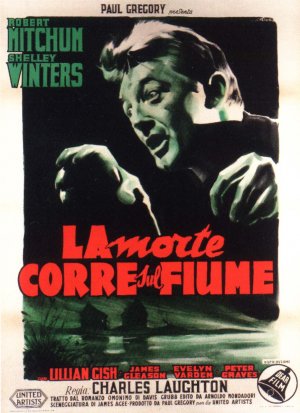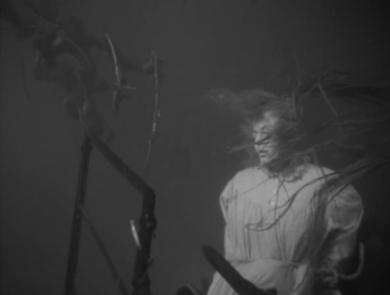
In the only film directed by Charles Laughton, The Night of the Hunter, we have an example of the danger of applying a template approach to establishing a picture as a film noir. Expressionist lighting and criminality – tick. But these elements alone do not a noir make. The Night of the Hunter is a gothic tale of good versus evil: there is no ambivalence nor an inversion of traditional values. Good triumphs over evil and the story ends.
This is not to say Night of the Hunter is not a great film- it assuredly is. A tale about a psychotic and murderous Southern preacher terrorising two children who know the whereabouts of a loot of stolen money is not without flaws, but great nonetheless. The compelling screenplay, first class acting, atmospheric cinematography, and an enthralling stylised mise-en-scene from a first-time director make it great.
The editing is not fluid however, and the narrative flow suffers. Whether this is due to cuts made after completion of the preview version is uncertain. In a new book on the making of the movie, author Jeffrey Coachman says Laughton re-interpreted James Agee’s script, which itself was based on the first novel of Davis Grubb. The original Agee script surfaced in 2003, and out-takes still exist and have been viewed by Couchman. Also certain studio scenes clash jarringly with on-location shots. Scenes in a small town near the end of the film are so obviously set-bound, that the drama takes on a theatrical tone which weakens the ‘reality’ of the story. The ending steers perilously close to sentimentality, but is saved by the luminous acting of Lillian Gish.
Other weaknesses relate to a certain moral relativism. The opening scene that establishes the story arc is not as strong as it should be – a weak performance by Peter Graves as the father on-the-run with the loot is redeemed only by the young actors playing his children. The father is caught and hanged, after sharing his cell with the evil preacher played superbly by Robert Mitchum, who learns that the loot has been hidden but not where. In the cell, disturbingly, the father justifies his crime, and presumably the killing of two people during the robbery, by saying he did it so his kids would not suffer during the hard times of the depression. After the hanging, the hangman is shown going home to his wife and young children and his remorse is clearly established. Yet at the end he is shown gleefully anticipating the hanging of another man – the preacher. An elderly married couple who are friends of Grave’s widow and portrayed as the salt of the earth in their generosity and concern for the woman alone struggling to raise her two children, at the end of the movie are transformed into unhinged rabble-rousers screaming for revenge and leading a lynch mob.
These weaknesses aside, there are stunningly elegiac scenes as the story unfolds. The most compelling is of the murdered widow still sitting upright in a car submerged in a river.


Fascinating revew, Tony. I’ve been looking forward to your piece on this since you announced you would be tackling The Night o the Hunter a couple months back. This is a fine, detailed and extremely well-written piece that takes an unusual perspective on the picture. I love the film–and I agree with others who insist it’s not noir–but your piece has given me much food for thought and consideration, especially whenever I revisit the picture yet again. Thank you!
LikeLike
Thanks Alexander, but my piece is not a patch on your penetrating review at Coleman’s Corner in Cinema.
LikeLike
This is a probing and analytical piece, which certainly does not take the celebrated ‘greatness’ of this film for granted. I can certainly evince some agreement with the ‘moral relativism’ disclaimer, but I am not sure I’d take issue myself with Laughton’s re-interpretation of Agee’s script, even though you do feel the narrative flow was adveresely affected by this. Ms. Gish was surely wonderful, and there are many striking compositions. (including the shuddery one of the woman submerged that you show here in stunning clarity). Certainly, the cinematography on this film by Stanley Cortez is outstanding, as is the entire visual look. And then there’s Robert Mitchum. It’s various allegorical thread’s are examined acutely in the rightful link you provide here to Alexander’s brilliant essay, but you have done a marvelous job yourself, I must say!
LikeLike
“I must admit actor/director Charles Laughton “tiptoed” in ‘Welles” and “noir” territory with his use of German Expressionism, high contrast lighting, deep shadows and the use of highly stylized distorted angles of reality when it came to the set design of his classic 1955 film The Night of the Hunter.” (Btw, The (my) quote above was copied and pasted)
Hi! Tony,
I must admit this film is beyond classification. But,
some authors do list this film as noir in their book(s)(such as: author Foster Hirsch, see comment below…) while on the other hand, some authors don’t list this film as a film noir in their books.(such as: author Spencer Selby)
Speaking of authors,…
…I was told by others (“Noiraholics”) if I wanted to read a “definitive” book about the 1955 film Night of the Hunter that I should “pick-up” a copy of the book Heaven and He** To Play With by Preston Neale Jones. According to a reviewer, that reviewed author Preston Neale Jones’s,” book… The film “The Night of the Hunter” is a “bonofide anomaly” in the noir canon, a film that harken back to the silent era in it opulent expressionism.
The only film directed by celebrated actor Charles Laughton, adapted from David Grubb’s haunting evocative novel. It has transcended noir to become a recognized film classic.”
Cont…
LikeLike
Cont…The definition of Expressionism: Expressionism represent feelings and moods rather than objective reality.
Expressionism usually represent external reality in a highly stylized and subjective manner, attempting to convey a psychological or spiritual reality rather than a record of actual events.
According to author Foster Hirsch,(Film Noir: The Dark Side of the Screen)
The 1955 film Night of the Hunter was “Full-blown Hollywood Expressionism- “Because German Expressionism, was very influential in forging the “noir” style.
“…in Charles Laughton’s 1955 film Night of the Hunter the film is closer in spirit and visual design to the German Expressionist films than any other “noir” thriller.”
Allegory, Symbolic,
Dcd 😉
LikeLike
Thanks Sam and Dcd.
Sam, I was speculating only about the editing issue and Laugthon’s reworking of the script. It would be interesting to have a look at the out-takes.
Dcd, as I said expressionism may help us identify a noir, but it is not a sufficient identifier of itself. I also disagree with Hirsch’s implication that a film is less or more noir based on the degree of expressionist stylisation.
LikeLike
Hi! Tony,
Tony said,Dcd, as I said expressionism may help us identify a noir, but it is not a sufficient identifier of itself.”
Yes, I agree with you, but I was just trying to point out by referencing author Foster Hirsch, that unlike, Alexander Coleman, he think the film Night of the Hunter fit into the category of a film noir, nothing more nor nothing less.
In other words, I was just providing an example of, why he (author Foster Hirsch,) believe the film Night of the Hunter has elements of a film noir.)
Tony said,”I also disagree with Hirsch’s implication that a film is less or more noir based on the degree of expressionist stylisation.”
(Tony, personally, I wasn’t trying to prove Mr. Hirsch, case…one way or the other, when it comes to his thoughts about noir being based on the degree of expressionist stylization. But, your point is well taken.)
Where as on the other hand, Alexander Coleman, stated that he doesn’t consider the film Night of the Hunter” a film noir “period.”
Therefore, I was just pointing out the difficulty in “classifying” this film. As stated earlier by, the reviewer… Where he referred to this film as a “bonofied anomoly.”
Now, I truly digress,…a very nice foreign poster of the film Night of the Hunter. (Btw, I sended you an email with “updated” information.)
Tks,
Dcd 😉
LikeLike
Dcd, you know you can disagree with me – sometimes 😉
LikeLike
Tony, I have to wonder why you critique the moral relativism of this movie as a weakness. Moral ambiguity in itself is a major theme of noir, and the fact that the adults in the film all have moral failures isn’t a weakness of the movie – it’s the whole point. I agree with the ending bordering on sentimentality with its preachy nature – but she does explicitly state that children are the strongest of humankind. It is when their innocence and endurance are broken, and they refuse to “accept their lot in life,” that they become the moral failures.
Though, I do agree that this is not a noir. The expressionism seems to be the only thing suggestive of noir. The fact that there is a clear good and evil is my strongest reason for rejecting it as a part of the genre.
LikeLike
Thanks for your considered insights Donny. I think I could have expressed my concerns better: what I was trying to say is that the reversal from righteousness plays false for me.
LikeLike